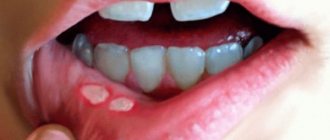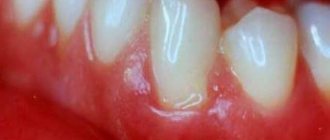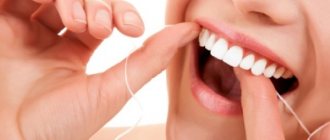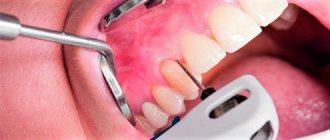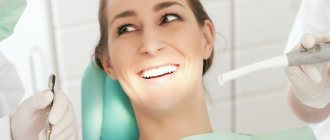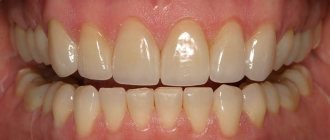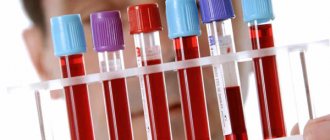The phenomenon of gum inflammation during pregnancy is actually not rare. Many expectant mothers face a similar problem during this period. And this happens mainly due to the fact that during the period of gestation, the pregnant woman’s body is subjected to severe stress, immunity decreases, and the woman experiences a lack of various vitamins. This phenomenon cannot be ignored, because any inflammatory process is the result of any infection entering the body, which can harm both the child and the woman herself.
Gum inflammation during pregnancy
Why do gums become inflamed during pregnancy?
There are many different microorganisms in the human oral cavity, regardless of whether he or she takes care of hygiene. When the gum swells, a space, a so-called “pocket”, forms between it and the adjacent tooth, which becomes a breeding ground for various bacteria.
Important! If at the same time a pregnant woman abuses food with a high sugar content, in this case the risk of developing various dental diseases increases several times.
People with a sweet tooth are more likely to experience dental and gum disease
Moreover, inflammation of the gums increases salivation, as a result of which the patient begins to feel a constant feeling of hunger. Such features during pregnancy cause rapid proliferation of microbes in the oral cavity. In addition, as a result of the vital activity of microorganisms and bacteria, the inflammatory process spreads, which can cause very severe discomfort.
Due to gum inflammation, salivation increases, and a pregnant woman wants to eat more often
This phenomenon occurs quite often among pregnant women, and the first symptoms of inflammation can be detected already in the first trimester of pregnancy.
Catarrhal inflammation occurs as a result of the accumulation of a large layer of plaque. The gums are noticeably inflamed and bleed heavily. In severe cases, inflammation can spread from one side of the jaw to the other, healthy one.
Catarrhal gingivitis
If a woman during pregnancy, after the manifestation of such a problem, continues to be negligent about oral hygiene, the inflammation passes into another form and becomes hypertrophic. The inflammatory process usually develops into this form by the 4th or 5th month of pregnancy. The inflammatory process begins to affect the gums around the lower incisors, later moving to the soft tissue around the fangs. This form of the inflammatory process has such a distinctive feature as severe swelling of the gums in the affected area. The soft tissues increase, and after some time the patient may notice the appearance of bad breath.
Important! This inflammatory process is accompanied by profuse bleeding.
About hypertrophic gingivitis
If, upon discovering these symptoms, treatment is not started in time, the teeth at the site of inflammation will soon begin to loosen. Such inflammation of the gums in a neglected state leads to gradual loss of teeth.
If inflammation is not treated, teeth will begin to deteriorate greatly.
Due to the fact that the pregnant woman’s body is at this moment in a weakened and vulnerable state, and the general immunity of the body is sharply reduced, inflammatory processes in the oral cavity may be accompanied by the appearance of small ulcers on the surface of the gums.
But there is no need to panic ahead of time and worry about tooth loss. Even if the inflammatory process began to occur in the patient’s oral cavity with the onset of pregnancy, this does not mean that this phenomenon will immediately take a severe form.
If you start treatment on time, serious consequences can be avoided
In order to prevent the inflammatory process from developing into a more serious one, which can lead to various complications, you just need to consult a doctor in time for help and treatment.
Important! The longer the patient delays treatment of teeth or gums, the more difficult the treatment will be.
About the symptoms and treatment of gingivitis
From the moment a woman finds out about her upcoming pregnancy, she should carefully monitor the cleanliness of her oral cavity. It is also necessary to monitor your diet during pregnancy, because eating certain foods can only aggravate the situation. A thorough examination of the oral cavity can help to timely identify the initial signs of inflammatory processes in the gum area and take measures to eliminate it.
It is better to visit a dentist at the very beginning of pregnancy to check the condition of your teeth and gums.
Causes of gum inflammation during pregnancy
The oral cavity creates an optimal environment for the development of a huge number of microorganisms and bacteria, even with thorough cleaning. But not all microparticles are pathological - some of them perform a number of useful functions, many are neutral, but the rest are pathogenic and pose a serious danger, especially under certain conditions. A decrease in immunity, which always occurs during pregnancy, is one such condition.
Inflamed gum
Very often, gingivitis in pregnant women is associated with a general change in hormonal levels. The woman’s placenta and the fetus itself, throughout the entire period of pregnancy, produce hormones such as progesterone and gonadotropin; it is their increased content in the body of the expectant mother that causes various changes.
In a healthy woman, pregnancy proceeds normally and fluctuations in hormonal levels practically do not affect her condition, but still, about 20% of women suffer from gum inflammation. And if the pregnancy is pathological, then the risk of complications increases tenfold.
In addition to hormonal imbalance, the causes of gingivitis include:
- Toxicosis , under its influence, the release of gastric juice increases the acidity of saliva, thereby creating an optimal environment in the oral cavity for the development of pathogenic microorganisms.
- Changes in taste preferences also change the normal environment of the oral cavity - this is caused by the constant desire of a pregnant woman to eat something sour, sweet or salty, and sometimes all at the same time.
- Hypovitaminosis , caused by a lack of vitamins. The growing fetus is forced to constantly “take” the necessary minerals and elements from the mother, which negatively affects her health.
- Oral hygiene problems . Many pregnant women, due to some reasons, for example: nausea or even vomiting (occurring whenever such a manipulation is performed), stop brushing their teeth and using mouthwashes, which also leads to the development of an environment in the oral cavity that is favorable for the development of inflammation.
- The course of pregnancy can provoke an exacerbation of some chronic diseases of the expectant mother, which can also lead to inflammation of the oral cavity.
Gingivitis in pregnant women can appear as early as the first or second month after conception and develop until the very moment of birth. In the second and third trimester, gum inflammation often takes on a chronic form.
Gingivitis – inflammation of the gums
How to recognize the presence of an inflammatory process in time?
There are a number of specific signs and symptoms that can indicate the beginning of an inflammatory process in the oral cavity. Among them:
- visible swelling in the affected area;
- change in gum color. In the affected area, the gums may acquire a reddish or bluish tint;
- When brushing your teeth or eating excessively hard food, bleeding occurs at the site of inflammation.
Inflamed gums turn red or blue
It is these three signs that can indicate that there is already incipient inflammation in the oral cavity. Most often, these symptoms make themselves felt in the first trimester of pregnancy, especially in the second or third month. In this case, you don’t even have to constantly examine the oral cavity for swelling or bleeding.
Important! When inflammation just begins, the gums already become too sensitive and painful.
Gingivitis in pregnant women
Some women notice blood when brushing their teeth during pregnancy. At the same time, many of them begin to brush their teeth less often than usual, so as not to further injure the affected gums. But such actions are wrong, because if in such a situation you perform hygiene procedures less often than necessary, pathogenic microorganisms will accumulate in places of inflammation, which will cause deterioration of the gums. What can we say about food debris that accumulates on the surface of the teeth and in the formed “pockets” of the gums and also irritates the affected areas.
Blood when brushing teeth
Symptomatic manifestations
Signs of gingivitis in pregnant women are the same as in ordinary people and are characterized by bleeding gums; some soreness and enlargement of the papillae of the inflamed gums and soft tissues of the oral cavity. But there are also distinctive features. During pregnancy, the disease takes two forms:
- Catarrhal - the gums swell quite strongly, become hypersensitive and begin to bleed heavily. A yellow plaque appears on the teeth, which practically does not come off when brushing your teeth. The pathology covers both jaws - almost the entire surface of the gums. This form of inflammation develops already in the second or third month.
- Hypertrophic - this form of the disease is quite severe and is a consequence of catarrhal inflammation. Often the process begins in the lower jaw, the soft tissue of which begins to grow. A woman develops a strong, unpleasant odor from her mouth, bleeding from her gums increases, and subsequently, if the pathology is not treated, her teeth begin to loosen and simply fall out.
Infectious diseases and decreased immunity can also provoke ulcerative inflammation of the gums. The main signs of this process are microscopic ulcerations of the surface of the gums, the appearance of which is accompanied by severe burning, discomfort, swelling and bleeding. In addition, such rashes cause quite severe pain. Based on the symptoms, doctors determine the severity of the process: mild, moderate or quite severe . Treatment depends on the form of development of gingivitis.
Catarrhal gingivitis. Photo.
But, if the gums become inflamed during pregnancy, the pathology does not necessarily become severe - the main thing is timely consultation with a doctor and treatment. If symptoms such as: unpleasant and even painful sensations when brushing your teeth appear; redness (in some cases even blueness) of the gums, their swelling; bleeding not only when brushing your teeth, but also when chewing solid food - it is recommended to immediately consult a dentist.
Neglected pathology can lead to irreversible and quite negative processes in the intrauterine development of the fetus!
The microflora of the mother's mouth affected by gingivitis actively releases toxins and pathological decay products of bacteria into the blood. Through the bloodstream, through the placenta, mediators enter the fetus and negatively affect its formation. In addition, such microorganisms provoke the synthesis of prostaglandin, a hormone that increases the risk of premature birth.
Gingivitis in pregnant women provokes spontaneous miscarriage several times.
Diagnostics
If a pregnant patient comes to a specialist with a complaint of bleeding or inflammation in the gum area, the dentist will first send her for a blood test. It is necessary to find out whether gum pathology is associated with a decrease in immunity due to pregnancy. It is imperative to clarify this fact.
Important! If the inflammatory process is truly associated with a decrease in immunity, treatment of gums without the use of special medications to increase immunity will simply be ineffective.
General blood analysis
There is another reason for the occurrence of inflammation, which has nothing to do with the existing pregnancy. Bleeding and inflammation can result from the appearance of tartar. In this case, it is recommended to remove the stones especially carefully. It is important to remember that during pregnancy it is prohibited to use ultrasound radiation, so in such cases stones can only be removed mechanically. In such a case, specialists usually specially prepare a number of specific drugs that do not harm the fetus and therefore can be used during pregnancy.
Tartar may be the cause of gum inflammation
The second trimester of pregnancy is the most appropriate time to visit the dentist. It is at this stage of pregnancy that various pathological processes in the oral cavity are just beginning to emerge. That is why a visit to the dentist is necessary to identify various unfavorable processes in the initial stages. Professional teeth cleaning, which can be performed on pregnant women, will also be a beneficial procedure. Such manipulations can prevent inflammatory processes in the gums in the later stages of pregnancy.
Important! Professional cleaning can slow down and temporarily stop the process of plaque growth on the surface of the teeth, which causes the appearance of tartar, and subsequently inflammation and bleeding of the gums.
It is better to treat teeth in the second trimester of pregnancy
Treatment with folk remedies
It is easy to treat minor gum inflammation with folk remedies in the initial stages. If the disease does not go away, and the condition only worsens, then folk recipes can only be used as part of complex therapy. To select suitable treatment combinations, you need to consult a specialist.
There are many folk remedies that have antimicrobial, anti-inflammatory and analgesic effects. The following folk recipes, safe and effective, should be taken into account by pregnant women.
- Propolis tincture. Dissolve a few drops of tincture in warm water and rinse 3-4 times a day.
- Homemade salt paste. Grind 3 tbsp. spoons of salt in a coffee grinder, mix it with olive oil until the consistency of sour cream. Rub into gums 2 times a day.
- Herbal decoctions. Rinsing with decoctions of chamomile, oak bark, sage, and thyme are very effective when used frequently.
- A solution of soda and salt. Dissolve 1 teaspoon of salt in a glass of warm water, add 0.5 teaspoon of soda. Rinse 3 times a day.
- Aloe and honey. Mix 1 tbsp. spoon of aloe juice with 4 tbsp. spoons of honey. Lubricate your gums with the resulting paste.
- Birch tar. Rub into affected areas of gums.
An excellent home treatment option is gum massage. After brushing your teeth, without rinsing off the toothpaste, massage your gums with light movements with your fingertips. Hands should be washed with soap before doing this.
How to treat gum disease during pregnancy?
If the inflammatory processes are not associated with a decrease in immunity, the patient can expect a number of different procedures that will help get rid of the problem and prevent its recurrence in the future. In order for the gums to return to normal, it is necessary to remove any irritants: yellow plaque on the teeth, tartar deposits, etc. A woman can be calm, because during the procedure dentists use only safe products that cannot harm the child.
Doctors use safe products that will not harm the baby in the womb
Maintenance therapy also plays a big role in normalizing the condition of the gums after professional teeth cleaning. As a rule, a specialist prescribes special mouthwash solutions to the patient, which contain a number of components that have antiseptic and anti-inflammatory properties. These products are able to maintain the health of the gums and bring them to normal condition in a short time, as well as prevent a recurrence of the inflammatory process. In addition, these products have a pleasant taste and freshen breath, and also eliminate bad breath, if any. Chlorhexidine rinsing is also suitable for the same purposes.
"Chlorhexidine"
Gels can also be used to relieve the inflammatory process. These products are more effective than rinses because the gel form allows them to remain on the surface of the affected gum longer. That is why the therapeutic effect of these drugs is longer.
One of the most common gel products for gums is Asepta balm. This remedy accelerates the process of regeneration of affected tissues, and also fights various pathogenic microorganisms, preventing them from re-starting the inflammatory process in the gums.
Balm “Asepta”
Medicines based on propolis are effective. They have a strong anti-inflammatory effect. Propolis has the ability not only to eliminate pathogenic microorganisms, but also to regenerate and heal damaged cells in the gum tissue in a short time.
Propolis-based products are very effective
Safe treatment of gingivitis in pregnant women
The dentist is included in the list of mandatory specialists to visit during pregnancy. He will be able to detect the disease in time and prescribe safe treatment for gingivitis. The peculiarities of therapy for pregnant women are that measures aimed at eliminating gingivitis include only the removal of tartar and plaque, anti-inflammatory therapy and the prevention of re-development of inflammation, that is, therapeutic measures only imply relief of symptoms.
The first stage of treatment that the dentist will perform will be professional teeth cleaning. Dental plaque will be removed mechanically using Air Flow or ultrasound. The idea that ultrasound, which is used in this procedure, harms the fetus is absolutely groundless: throughout pregnancy, a woman undergoes scheduled ultrasound examinations at least three times. As an anti-inflammatory therapy, the doctor will select drugs that can act as gently as possible on the vulnerable body of a pregnant woman. Their use comes down to a local effect on the gum tissue: rinsing, baths, irrigation.
What folk recipes can be used for gum inflammation during pregnancy?
During pregnancy, you can also use traditional medicine. There are several recipes that are not only effective, but also safe for use during pregnancy.
| Means | Description |
| Oak bark solution | You need to take 50 g of oak bark, previously crushed. These shavings must be filled with two glasses of water, and then bring the solution to a boil. After this, the solution must be left to simmer over low heat for 30 minutes. The decoction is ready. You just need to cool it, pass it through a sieve or cheesecloth to get rid of the shavings, and then you can use it. Rinse with this solution six to eight times a day. |
| Chamomile decoction for gums | You need to take crushed chamomile and pour three to four tablespoons of it into one glass of water. The resulting mixture must be infused in a warm place for at least twenty minutes. After which the solution also needs to be filtered from the petals, for more convenient use, and rinse your mouth with the resulting infusion about four to five times a day |
Various folk remedies for mouth rinsing will be useful for a pregnant woman
Important! Solutions with oak bark and chamomile are most often used in the treatment of inflammatory processes in the oral cavity, but in addition to them, there are several equally effective traditional medicine recipes that are allowed to be used during pregnancy.
Drug treatment during pregnancy
Inflammation of the gums during pregnancy is a disease that can be treated using the most gentle methods. In the early stages, the doctor removes tartar and plaque. The procedure is performed with hand tools, because modern painless ultrasonic and laser cleaning procedures are contraindicated for pregnant women.
Further, if the disease is not advanced, treatment is limited to recommendations for proper nutrition and hygiene procedures:
- saturate your diet with vitamins;
- reduce the amount of carbohydrate foods;
- rinse your mouth thoroughly after each snack;
- floss to remove food debris after each meal;
- choose a brush with medium-hard bristles;
- brush your teeth 2 times a day;
- use specialized toothpastes that relieve bleeding gums.
Treatment with medications should be prescribed with caution, since pregnancy is a contraindication for many medications that seem completely harmless at first glance.
We suggest you familiarize yourself with the smell of fish from the mouth of a child or an adult
If the inflammation has reached a serious stage, then you cannot do without anti-inflammatory drugs. Remember that they should only be prescribed by a specialist.
Of course, you should inform the dentist about your “interesting situation” at your first visit.
The therapeutic course is usually 7-10 days. Even those safe medications that can be used for treatment during pregnancy should be used for no more than 14 days.
How to rinse gums during inflammation during pregnancy?
- Chlorhexidine solution 0.05% reduces the amount of plaque and destroys pathogenic microflora that causes inflammation.
- Herbal infusions of chamomile, sage, and calendula have a mild antiseptic effect and help relieve bleeding gums.
- Products containing sodium fluoride or aminofluoride kill pathogenic bacteria in the mouth and reduce the risk of developing caries, which can aggravate gum disease.
- Parodontax Extra contains both fluoride and chlorhexidine, designed specifically for the treatment and prevention of gum disease.
- Maraslavin relieves pain and inflammation. Rinse your mouth 4-5 times a day. Use with caution for caries due to the demineralizing effect on the teeth.
- Stomatidin has an analgesic and anti-inflammatory effect, helps relieve bleeding gums, but is contraindicated in the first trimester of pregnancy.
- Furacilin solution is a good antiseptic. To prepare it, you need to dissolve 1 tablet in a glass of warm water.
You need to rinse your mouth 2-3 times a day, for at least 45 seconds. In addition to rinsing, if necessary, the doctor can prescribe gels that not only have an antibacterial effect, but also relieve pain.
- Metrogyl Denta has an antimicrobial effect, but is contraindicated during pregnancy in the first trimester.
- Dentinox acts as an anesthetic and relieves inflammation.
- Dental solcoseryl has a regenerating effect, promotes gum healing, and helps relieve bleeding.
Gels such as Kamistad, Metrodent, Cholisal are contraindicated during pregnancy.
In case of advanced disease and complications, antibacterial therapy can be carried out using antibiotics. Taking antibiotics should be carried out under the strict supervision of a doctor, because self-prescription can lead to fetal defects.
Is it possible to relieve inflammation with a toothbrush?
In cases where the inflammatory process has just begun to develop, you can try to get rid of it yourself at home. But these methods can only help at the very first stage of the onset of the inflammatory process. In order to remove inflammation at home, you need to arm yourself with a brush and dental floss.
You can get rid of gum inflammation in the early stages using a toothbrush
- First you need to perform all the steps that include proper brushing of your teeth. It is important to pay attention to this process, because many people perform it mechanically, without even thinking about whether they are actually brushing their teeth correctly. To prevent your gums from becoming inflamed and bleeding during brushing, you must hold the toothbrush at an angle of forty-five degrees relative to the surface of the teeth. The brush should be moved in a circular, soft motion without strong pressure.
It is important to brush your teeth properly - If you suspect the onset of an inflammatory process in the gums, it is advisable to brush your teeth more than twice a day, and best of all, after each meal.
- To make cleaning more effective, you need to learn how to use special dental floss, which allows you to thoroughly clean the spaces between your teeth. Bleeding when brushing with dental floss is normal, as the floss can irritate previously inflamed gums.
How to use dental floss? - It is recommended to periodically use a mixture of water and soda to clean the mouth. The consistency of the mixture itself should resemble a viscous slurry, which is applied to the surface of the teeth, and then the teeth are brushed. This mixture allows you to remove all bacteria present in the oral cavity.
- Also, if the gums are inflamed while carrying a child, it is recommended to make a solution of three percent peroxide and boiled water in a one-to-one ratio.
You can rinse your mouth with a product made from hydrogen peroxide and boiled water.
Diagnosis of the disease
Only a dentist can make a final diagnosis, however, the first signs of the disease will also be noticeable to the patient. Any unpleasant sensations in the oral cavity should alert a woman.
Even if a pregnant woman has never encountered dental diseases and has recently cured all her diseased teeth, no one is immune from gum inflammation, especially when global hormonal and physical changes occur in the body.
One-time bleeding is not terrible, because, most likely, it is caused by mechanical damage, but if your gums bleed regardless of brushing your teeth, then you should visit a doctor who will tell you in detail how to treat gum inflammation during pregnancy.
Is it possible to treat inflammation during pregnancy with antibiotics?
First, you need to figure out why inflammation occurred, because the reasons for its appearance are actually very diverse.
Important! It is advisable to use antibiotics in the treatment of inflammation only if it was caused by the activity of pathogenic microorganisms.
Antibiotics are used if gingivitis is caused by the activity of various bacteria
Antibiotics are often used to treat inflammatory processes in the oral cavity. Doctors use different types of such drugs.
Types of antibiotics
Pregnant women very often begin to worry about taking medications, especially strong ones such as antibiotics, while carrying a child. To decide whether this therapy is really necessary, you need to consult a specialist and find out the cause of the inflammatory process.
Not every pregnant woman is allowed to take antibiotics
It is also necessary to identify chronic diseases that the patient may suffer from. Indeed, in the presence of certain pathologies, the use of antibiotics is strictly prohibited.
Important! If you have any inflammation, you don’t need to immediately run for antibiotics, much less “prescribe” them for yourself. After all, antibiotics, like many medications, can bring not only benefits, but also great harm if taken incorrectly.
What are the dangers of taking antibiotics during pregnancy?
- The appearance of allergies.
- Antibiotics cause a strong blow to the digestive system. That is why, when taking these medications, patients often experience the appearance of dyspeptic disorders, as well as pain and heaviness in the stomach or nausea.
Taking antibiotics may cause nausea in a pregnant woman - The function of hematopoiesis is also often impaired by antibiotics, so the body’s immunity can sharply decrease.
- Most of all, women are afraid of the negative impact that these drugs have on the development of the fetus. This is especially dangerous in the first trimester of pregnancy, when the development of the child’s organs and systems begins.
Complications when taking antibiotics
How to treat gingivitis during pregnancy
Treatment of gingivitis during pregnancy is a whole complex of various procedures aimed at eliminating not only the consequences of the disease, but also the causes that provoked it.
It is advisable, even at the stage of family planning, to visit the dentist for preventive purposes and make sure that there are no potentially dangerous factors, as well as have your teeth cleaned to prevent the risk of developing pathology. But if, nevertheless, the disease makes itself felt already during pregnancy, certain anti-inflammatory drugs are used to restore the normal state of the gums.
The question is often raised on forums about ways to combat gingivitis in pregnant women. Women participating in the forum are interested in how to treat a disease such as gingivitis during pregnancy, and which drugs will be the most effective and safe in this situation.
- As an anti-inflammatory treatment for gingivitis during pregnancy, heparin ointment and acetylsalicylic acid ointment (3%), which normalize vascular tissue permeability, are recommended.
- To restore blood circulation in blood vessels and tissues, Cholisal and Solcoseryl are prescribed.
- Medicinal electrophoresis and massage procedures help cure the disease and cope with its consequences.
- A balanced diet including essential vitamins can increase the protective forces of the female body.
- Treatment of the oral cavity with hydrogen peroxide, oral administration of lidase and glucose as a preventative measure help to avoid relapse of the disease.
In complex clinical cases, a pregnant woman undergoes surgery to remove areas of hypertrophied tissue, using only high-quality and safe anesthetics.
Oral hygiene for gum inflammation
Experts say that the presence of gum inflammation in a pregnant woman several times increases the risk of giving birth ahead of schedule. This occurs due to the fact that microbes, whose vital activity causes inflammation, are capable of releasing toxic substances into the patient’s body.
Important! During pregnancy, these toxic substances from the mother's body enter the child's body, which can lead to serious consequences.
Gingivitis increases the risk of preterm birth
These same toxic substances can negatively affect the female hormone responsible for uterine contractions. This is why the risk of not only premature birth increases, but also miscarriage. According to statistics, children born to women who experienced dental problems during pregnancy are more susceptible to caries, and most often the teeth of such children begin to suffer greatly from a very young age.
In order to prevent pathologies that are associated with problems with teeth and gums in a pregnant woman, it is necessary to monitor oral hygiene and carefully check the condition of the gums and teeth from the very beginning of pregnancy. It is in this case that it is possible to detect and quickly eliminate all dental problems.
Dental treatment during pregnancy
During pregnancy, proper dental care is very important. It is necessary to regularly check your teeth with a dentist and adhere to good hygiene. This will be the key to protection against the appearance of tartar, plaque, and gingivitis.
During pregnancy, you should visit the dentist regularly, as he should clean your mouth and reduce the risk of diseases on your teeth and gums. Usually, the trip is prescribed in the second trimester, after the vital organs of the fetus are already formed.
Despite the fact that cleaning does not harm in the first and third semester, this procedure, done during the second, reduces the risk for the baby. If the mother suffers from gingivitis or other gum disease, the doctor treats them.
Infections
If your mother experiences toothache or sees blood and pus, you should definitely consult a doctor. These are signs that indicate an infection. Infection develops faster during pregnancy due to decreased immunity. If it spreads throughout the body, there is a risk of miscarriage.
Emergency cases
In cases of injury or damage, you should also consult a dentist. If the doctor sees that a small piece of the tooth has been chipped off or a crack has appeared, but you can live with it for a while, then most likely they will advise restoration after childbirth. If the pain is very severe, the dentist may decide on treatment during pregnancy.
Treatments to avoid!
There are some treatments that are best avoided during pregnancy. Among them are whitening, implantation, installation of prostheses. If you need to cure a root canal, then you should wait until the baby is born, of course, if you are not in severe pain.
Also, avoid exposure to X-rays during pregnancy. It is also recommended to postpone procedures that require prolonged sitting in a chair.
